Following the 2017 Myanmar army crackdown against the minority Rohingya population, Gambia brought a landmark case against Myanmar at the International Court of Justice (ICJ), alleging they had violated their obligations under the Genocide Convention. In February 2020, Tony Neil (LSE) sat down with Daniel Aguirre (University of Roehampton and Former Senior Legal Adviser, International Commission of Jurists, Myanmar) to discuss the historic ICJ case of genocide, the legal arguments put forward by both sides at The Hague, and the nature of the violence against the Rohingya.
TN: What is the ICJ and why has Gambia filed a case?
DA: Thanks for inviting me to talk about this important issue. For me this issue is complicated because as a human rights activist I want to see justice. The military has acted with impunity in Myanmar for decades. They exist to oppress minority groups. On the other hand, as a human rights lawyer, we need to understand and explain the complexities of the law and ensure that even this military receives a fair trial – these are just some initial thoughts and opinions rather than thorough legal analysis.
We need to make clear from the beginning that there are two, possibly three, avenues for justice being discussed. The first is the case before the International Court of Justice between Gambia and Myanmar, which has just asserted jurisdiction and ordered provisional measures. The second is justice at the national level – the various courts and investigations conducted in Myanmar, which are widely regarded as inadequate and not independent. The third is the potential investigation of the crime of deportation by the International Criminal Court (ICC) relying on jurisdiction for crimes committed on the territory of Bangladesh. They are all related but it’s complicated.
The ICJ sits in the Peace Palace in The Hague (Netherlands), and is an international agency designed for states to solve disputes. The point of the court in principle is to provide a peaceful forum where states can have a legal dispute, most often over territory or the trans-border effects of pollution within rivers. Wherever there is a dispute between states, they have an outlet where they can go to have a fair, impartial, independent hearing and decide who is right. The idea of creating the ICJ was to avoid conflict in the future, as part of a global change in the 20th century away from armed conflict.
Gambia has filed a case against Myanmar alleging Myanmar has violated its obligations under the Genocide Convention. Why Gambia? Well, Myanmar’s obligations under the Convention are referred to in international law as Erga Omnes Obligations, meaning the obligations under the genocide treaty/convention are owed to every state who is a party to that convention. If there are violations, say if a genocide has occurred, or any of its inchoate crimes, or if a state has failed to prevent them, then any state can assert that these violations have taken place, and the ICJ has jurisdiction to hear disputes between states under international law. Both Myanmar and Gambia are parties to the Genocide Convention and Gambia has asserted that Myanmar has violated certain provisions of the Genocide Convention.
The court, in the initial phase of the case, ruled that they do have jurisdiction. Obligations are owed to the entire international community, therefore anyone who is a signatory has the ability to allege violations of these crimes before the ICJ.
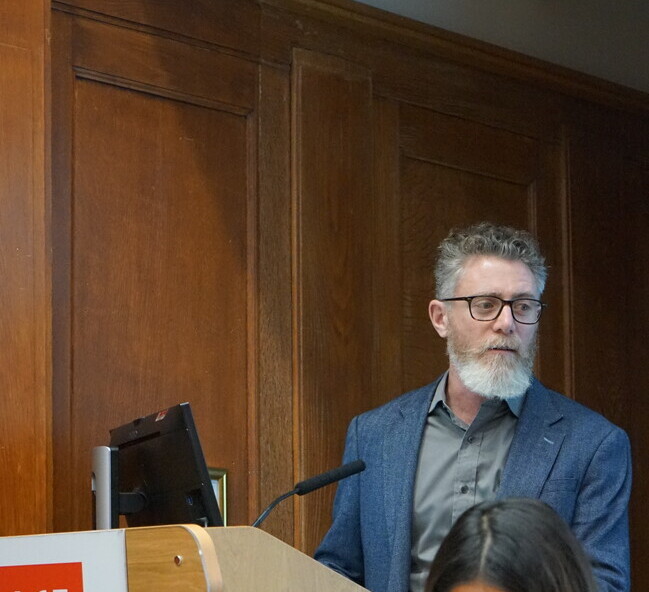
What were the legal arguments presented by both defense and prosecution in The Hague and how did the court rule?
This is where it gets complicated, and often disappointing, for activists, for the genocide studies scholarly community and for the general public, because violations of the Genocide Convention are criminal in nature – they are a part of international criminal law. This means that in addition to the actus reus, the intentional destruction of the group, the mens rea, the intention, must be proven: there must be an intentional plan to destroy the entire group.
This is the same as national law: if someone drives out onto the street in their car, hits a cyclist and kills them, they are not likely to be found guilty of murder because they didn’t intend to kill them. They are likely to be found guilty of manslaughter, or possibly civil liability. To be guilty of murder the court has to be persuaded that there is a mental element (mens rea) – an intention. That requires investigating the driver, speaking to his friends and witnesses, and investigating to establish what he intended to do. If the prosecution finds that he was sitting in the pub and had eight pints of beer and said to his friends, “I hate those cyclists, I’m going to go out and run over the first one I see”, and there is CCTV footage of them together over the eight pints, then you have some kind of proof, assuming you can get that witness to come forward. This establishes this mental element of the case, and possibly the premeditated nature of the act. This same criminal law concept applies to international criminal law.
The big difficulty for proving that Myanmar has violated the Geneva Convention is therefore to demonstrate that mental element – the intent to do so. It doesn’t matter how many are killed (although that may show an intent), you need to demonstrate that there was a plan to eliminate a group protected by the convention: a racial, ethnic and/or religious group of people. That is a difficult thing to do and is especially difficult when you’re not allowed into the country to investigate. It requires a forensic criminal investigation. You need to be able to get into government emails, communications and records, and you need to be able to show and find evidence in the field – and hopefully find insider witnesses with inside knowledge. You need to demonstrate the linkage between the crime, the intent and the perpetrator. There have been no investigations so far other than Myanmar investigating itself, which are clearly not independent or adequate.
What legal arguments has Gambia presented to the court in this case?
The Gambia alleges that the evidence presented by the UN Independent International Fact-Finding Mission on Myanmar (UNFFM) demonstrated that there was a large number of people killed. They also argue that pushing the Rohingya into Bangladesh indicates conditions similar to those of genocide – an intention to destroy the group. The problem is that all of their evidence is taken from victims themselves. In fact, very few people would doubt that these are crimes against humanity or even war crimes – Myanmar itself has indicated that this might be possible! Gambia has asserted, based on evidence gathered by the UNFFM and other bodies, as well as the opinions of various experts and UN Special Rapporteurs, that the conditions and indicators of genocide are all present.
Myanmar on the other hand is saying, “Yes, all these people have fled into Bangladesh, but we reacted this way as a result of a clearance operation against terrorism, and we had no intent to destroy this group of people.” In fact, Myanmar argued that they have built special camps for the Rohingya to live in that are an improvement on their previous accommodation.
During the hearings, Myanmar even said that there may violations of the law of war. They went on to argue that they are willing and able to investigate these cases at the national level and that the international community should not interfere. Myanmar have also argued that these crimes are not covered by the Genocide Convention and therefore the ICJ has no jurisdiction to look into these issues.
These are two very different positions, and it’s quite amazing because there is not much dispute over the facts. Myanmar has acknowledged many of the deaths, and all of the displacement of people. The argument is essentially over the intention of the military. They’re saying we didn’t intend to destroy this group, but we did carry out these clearance operations. Gambia is saying the clearance operations show the intent to destroy the entire group.
Has the ICJ made any ruling on whether a genocide has occurred or not?
In the case itself, the ICJ has not made any ruling on whether a genocide has occurred or not. In fact, they are only at the provisional measures stage. You can compare the provisional measures stage of this case to a family law dispute at a national level, where there is a dispute about domestic violence between a man and a woman and the court says, “Okay, while this case is going on, the man is not allowed within 50 meters of the spouse.”
What the court has done, which is good for the victims and proponents of international justice, is essentially saying, we have not yet decided on whether there is a violation of the Genocide Convention, but we assert jurisdiction over this case, because it involves potential violations. But in the meantime, we will impose provisional measures on Myanmar. These provisional measures include not committing genocide; preventing genocide at the national level; not destroying any evidence of genocide; and to report back in four months (and then every six months after) about how they are fulfilling those three provisional measures.
While there has been no decision on whether Myanmar violated the Genocide Convention, there is good news for the Rohingya people. The Court has essentially said in its provisional measures that the Rohingya count as a protected group, that the court is going to look into this matter, and that Myanmar now has to demonstrate that it is not committing genocide, preventing it from happening, and not destroying the evidence.
Myanmar has been unrepentant and recalcitrant since it committed these crimes. It has a long history of dragging its feet, acquiescing, and doing the bare minimum. Will it just blame the Arakan Army as a serious security concern and whitewash these provisional measures?
Yes. I think that Myanmar’s position in relation to the provisional measures is, first: of course we are not committing genocide and will not do so in the meantime; and second: we will of course prevent violations of the convention. The military never had the required intent to commit genocide. Third: we will not destroy evidence – in fact we are conducting investigations into the killings and allegations of human rights abuses against civilians. They will report all this back, plus probably some other attempts at reform in their report to the ICJ.
This becomes crucial when we talk about your other question on other forms of accountability, because Myanmar is now attempting to demonstrate that it is willing and able to investigate these alleged crimes. From the beginning, Myanmar’s argument was that it has always been its intention to follow the Genocide Convention, and that they’ve never violated it. In this case, Myanmar is going to try and show that they didn’t carry out a genocide.
On the reporting to the court, Myanmar can look at this as an advantage. This is their opportunity to show how our national investigations are proceeding, and I predict you will see token gestures, such as declarations not to do genocide or destroy evidence and possibly some welcome moves, like signing up to international conventions that they have not signed and ratified, such as the convention on the elimination of racial discrimination. They are one of the few countries in the world that is not a signatory to the convention.
In Myanmar, I suspect you’ll see low level soldiers put on trial in military and police courts for breaching or acting against orders and attacking civilians. Again, they will try and demonstrate that they are willing and able to investigate. In fact, you already see an increase in such cases in Myanmar just before the government published its Commission of Inquiry that claimed that there has been no intention of committing genocide. The message of the Inquiry was – Yes, some crimes have been committed, and we are investigating them. But this is the context of something that plagues every country: terrorism; and we’re reacting only to protect our country against terrorism, and of course some mistakes have been made. I’d therefore say that we’re likely to see a document from Myanmar demonstrating their wiliness and ability to investigate and to go along with the proceedings at the ICJ.
The tricky thing for them is the destruction of evidence. We know that they have destroyed evidence. We have the satellite footage (produced by Human Rights Watch and Amnesty International) of the bulldozing of villages etc.,. We also have allegations that the Arakan Army was threatening to disclose the locations of mass graves, but following such reports, the internet was suddenly shut down.
What are the other accountability mechanisms in effect, including the International Criminal Court (ICC)?
The ICC holds individuals accountable, whereas the ICJ holds states accountable. They have completely different processes. The ICC will want to investigate the actions of individual criminals, whether they are generals or soldiers or government officials. The ICC also has a wider range of offences than those strictly limited to genocide. These not only include genocide, but a whole range of atrocities covered in the Rome statute, such as widespread and systematic human rights abuses, crimes against humanity, and war crimes, such as breaking the laws of armed combat, targeting civilians, civilian infrastructure during conflict.
A big problem for Myanmar is that the ICC is investigating on the jurisdiction out of Bangladesh. The ICC is essentially voluntary, you have to be a signatory to the Rome statute. Myanmar has not signed it, but Bangladesh has. So, the ICC is now investigating whether they can prosecute the forced deportation of the Rohingya people into Bangladesh as part of the crime against humanity occurred on Bangladesh’s territory and they are a state party to the Rome Statute.
There are a couple of steps that would have to be taken here as the ICC itself is a complementary court, or a call “court of last resort”. Under the doctrine of complementarity, the ICC can only investigate if the State Party is unable or unwilling to investigate. Since Bangladesh is cooperating, there is real pressure on Myanmar to demonstrate a willingness and ability to investigate. Myanmar is arguing that this not the business of Bangladesh, the ICC or anyone else, rather that they themselves are investigating. They are desperate to avoid individual criminal responsibility as that would mean members of the military or high-ranking government officials having to answer to allegations of atrocity crimes.
There are complications for an ICC Investigation: The prosecutors are unlikely to be allowed in Northern Rakhine State to investigate – so their investigation is likely to take place in the refugee camps in Bangladesh, which limit their ability to find evidence linking perpetrators to the crimes.
From an international justice perspective, the hope is that ICJ will recognise that Myanmar’s investigations are not in line with international standards. Myanmar is unable and unwilling to investigate in line with international human rights standards. Its investigations are not independent or adequate. This would go a long way to supporting a subsequent investigation by the ICC.
The ICJ dispute and the ICC investigation are not related to each other, but it is interesting to see the Myanmar’s argument at the ICJ. They are arguing that they did not commit this specific crime [genocide], but that maybe other atrocity crimes were committed. These are punishable at the ICC – so they are gambling that military and government officials they will never be in front of the ICC. The generals and government officials seem to believe they are likely to ever find themselves there, as it would require Myanmar to hand them over.
Even if the ICC investigation can get past all these hurdles, and Bangladesh assists, Myanmar is not going to hand over senior figures, and it’s unlikely that their neighbours will either. At worst, official accused will no longer be able to travel to countries likely to arrest them and hand them over.
If Myanmar does not cooperate with either the ICJ or ICC, the international community ultimately depends on the UN Security Council to enforce compliance. This is a political body. You have China and Russia sitting there arguing that this is a domestic matter – allow Myanmar to investigate it. As historical precedent shows, they veto resolutions to do with Myanmar. They consider it holding up the domestic sovereignty of a state. Much would depend on France and the United Kingdom. And the current administration in the USA is unpredictable at best and obstructive at worst.
What constitutes robust evidence to prove intent in genocide? We are unlikely to find a smoking gun, such as leaked information, or a general going to Geneva.
Evidence is both direct and indirect, much can be inferred from different patterns, what people have said, and from the satellite imagery, but there does essentially have to be a smoking gun showing intent. If it is a criminal case before the ICC, guilt must be proven beyond reasonable doubt. It must be shown that there is no other reason that these acts occurred other than an intent to destroy the Rohingya. Genocide is a notoriously difficult crime to prove beyond a reasonable doubt.
Myanmar’s argument is that there are many other reasons why 800,000 are in Bangladesh: some fled, as they thought they had better chances of being repatriated to somewhere else; some panicked, they argue. Myanmar says they didn’t intend to kill them and are inviting them back; they just have to show their papers and plus, we’ve made this nice accommodation for them. So that is the thing, when we talk about genocide there is this very high burden of proof. It has to be beyond reasonable doubt. There can be no other plausible reason.
Is there something different and extraordinary about the violence against Rohingya?
First, they live in one of the poorest parts of one of poorest states in Asia. They are subsistence farmers. They are different from the majority both ethnically and religiously and so suffer all the discrimination of being poor and a minority ethnic and religious group. With the Rohingya, the ethnic-religious divide is clearer and more intense, too. There is an open hostility to Rohingya people and Muslims in general in Myanmar; if not hostility, then regular discrimination.
The Rohingya have been systematically targeted by subsequent governments in law. They have been denied full citizenship under the law and therefore protection under the constitution. Citizenship is so significant in Myanmar. The constitution states that rights only belong to citizens. Citizenship is tied to rights: being able to move, work, learn and be legally tied to the land. Being recognised as an ethnic group means you have claim to land and territory. This means the Rakhine are afraid of Rohingya being recognised because they are trying to establish their own independence. Myanmar has openly discriminatory laws (passed as late as 2015), and applies old laws in an openly discriminatory way. Discrimination is endorsed by the government. Officials use discriminatory language bordering on hate speech and even incitement to atrocity crimes. The media and social media are also allowed to be discriminatory. Social discrimination is essentially reinforced by the State. This all renders them as ‘the other.’
In your opinion, what is justice? Is something symbolic? Will it have tangible, direct benefits to survivors? Do these procedures enforce a guarantee of what the world has witnessed in Myanmar not being repeated?
Justice has to be access to justice for victims and accountability of perpetrators for their crimes. Right now, justice seems largely symbolic, but let’s not underestimate how important that is. In our lifetime we are seeing the Burmese/Myanmar government explain their actions to the international community. They are arguing it’s not genocide, yet admitting that all these problems have happened. Plus, we’re witnessing Aung San Suu Kyi basically saying she can’t control the military. All of this has already been laid bare to the international community. I mean, witness testimony from the camps was read out in the Court with Aung San Suu Kyi sitting right there. Sure, it might be the first time she’s heard it, but the entire world has access to that information, and that is a huge, huge step forward. Perhaps it’s symbolic but it’s a lot.
We won’t know about the exact impact for the victims until we’re a long way down the road. But already there’s something for victims. Often for victims, just having your story spoken out loud is a big step forward. It may seem largely symbolic to academics or activists, but to someone who has been silenced their entire life, having their story told to the world is a big deal and shouldn’t be underestimated.
Those studying human rights often look at international justice system may say, “Who will enforce this? It’s just symbolic.” But for victims it can show they have rights, and that justice does apply to them. The world is listening to them, and that’s a big deal.
This article gives the views of the authors, and not the position of the South Asia @ LSE blog, nor of the London School of Economics. Featured image: View of the sprawling Kutupalong refugee camp near Cox’s Bazar, Bangladesh. Credit: DFID, Flickr, Creative Commons. Image within text: Daniel Aguirre speaking at an LSE South Asia Centre event on 4 February 2020.



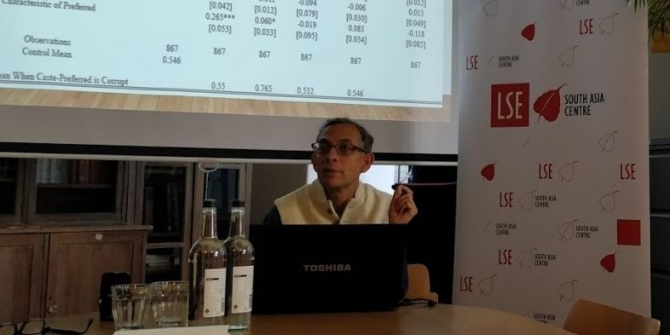
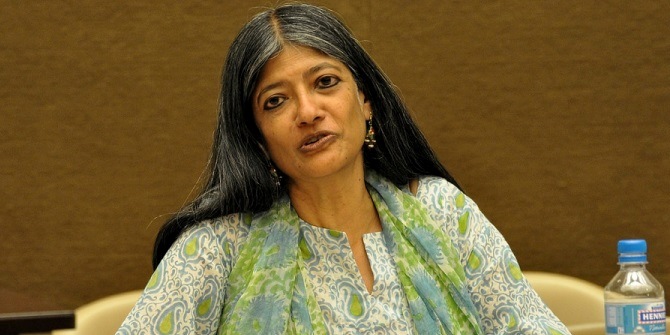
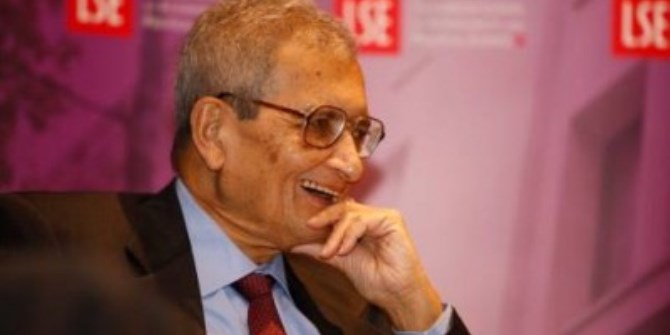
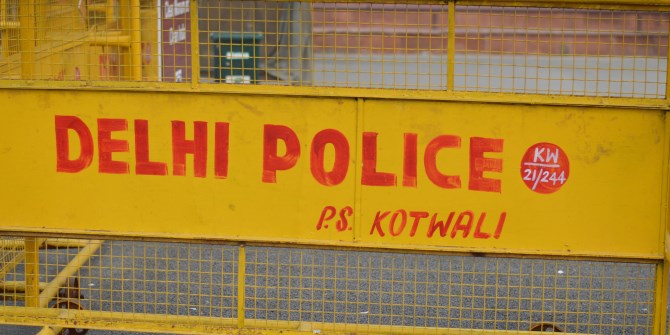

thanks for sharing its amazing really appreciated